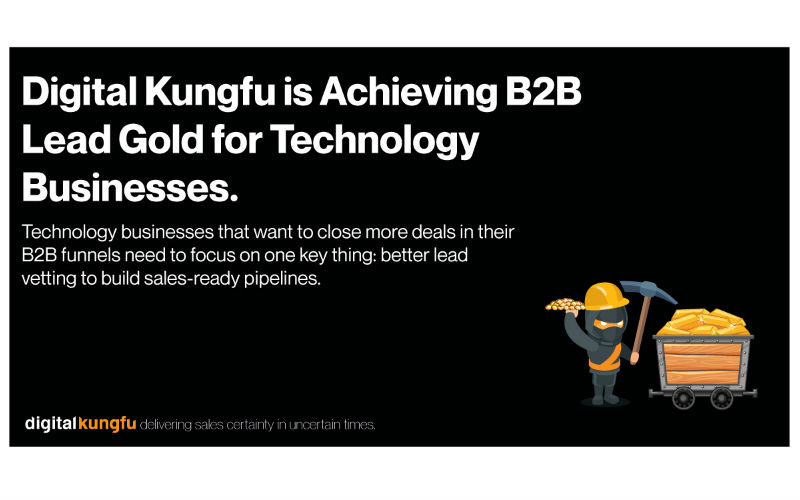
[ad_1]

Lead generation is the cornerstone of every successful marketing campaign and sales operation. But are you generating the right quality and number of leads that you need?
“You’ll experience a greater return on your investment in sales and marketing if your team’s energy can be focused in a targeted and systematic way on those most interested in buying from you,” explains Matt Brown, CEO of Digital Kungfu, a storytelling production house that specialises in generating sales-ready pipelines for technology businesses.
“When you know where your prospects are in their customer journey, you can generate more revenue with fewer leads. What we have found though, is that even though most businesses know that not all leads are the same, they don’t know how to score them or differentiate between them. If you put all your leads into the same bucket and then hand them over to sales to qualify and close, you’re asking your team to use their CRM system to arbitrarily score customers.”
Discover 6 proven strategies for UK lead generation during a recession. Download your free White Paper here.
Similarly, if sales isn’t feeding back to marketing, how can marketing be sure they’re targeting and attracting the most sales-ready leads? Digital Kungfu believes that the key to success is for sales and marketing to work together.
Download Digital Kungfu’s eBook: The ultimate B2B lead generation guide during a recession.
Creating sales-ready leads
The secret to success is bridging the divide between the leads that solid marketing campaigns can generate, versus the leads that sales considers ‘warm’ or ‘hot’ and will lead to opportunities.
“In Digital Kungfu’s world, we call these sales-ready leads, which means taking a marketing campaign that understands exactly who your ideal customer is, connecting with them, capturing their details and then vetting them according to your sales department’s criteria. This is the key step that so many businesses miss – not all leads are created equal, and so it’s essential to vet them and only hand over customers who are in the market to buy to your sales team.”
Most organisations follow a variation of this process:
- Marketing assigns a numerical score to each lead and hands it off to the sales department, usually through the CRM system (this is typically considered to be a market qualified lead, or MQL).
- Sales execs mine their leads, which have been assigned via the marketing department via their managers. If the sales exec secures a meeting or tele call, the lead is considered a potential opportunity, and therefore become a sales qualified lead, or SQL.
Imagine what your organisation would look like if you could improve MQLs and SQLs? You’d need a bigger pipeline coming in, but critically, a better vetting process as well.
“Not all leads are created equal. Sales teams spend too much time speaking to prospects because they were able to connect with them, and not because they are actively in the market to buy. The result is stalled and lost deals, and no-one knows why,” says Brown.
“The solution is for sales teams to focus their energy and attention on their best prospects, increasing win rates (and profits), but that requires better lead vetting, pure and simple.”
Qualify that lead
A good rule of thumb for qualifying leads is to focus on the following four criteria. Make sure sales and marketing each weigh in and then compare their answers.
“Our concierge lead vetting team follows a specific process and we use proprietary formulas to score leads and propensity to buy, but a good rule of thumb for all businesses is to focus on these four areas,” says Brown.
Budget: Can they afford what you’re selling? Google industry news and speak to other suppliers where appropriate for financial insights.
Authority: Is the person you’re contacting the decision maker? Or will you need to talk with someone else? Hint: Quite often, the decision maker will delegate to someone on their team the task of researching information on your product or service (and your competitors). So, while the person you are interacting with might not be the final decision maker, they should be considered an influencer. Whether they have the authority or not, whatever you do, relate to each person along the way with respect and courtesy, or it will come back to haunt you.
Need: Do they have a problem for which you can offer a solution? Are they reaching for a goal that you can help them achieve? Ask plenty of questions, listen to the answers, and always frame your presentations around how you can address the deepest needs you perceive them having.
Timing: Is their need immediate, soon, or eventual? An eventual need does not disqualify them; it just means you need to plan how and when you will maintain contact with them and continue to nurture the relationship.
Download Digital Kungfu’s eBook: The ultimate B2B lead generation guide during a recession.
[ad_2]
Source link